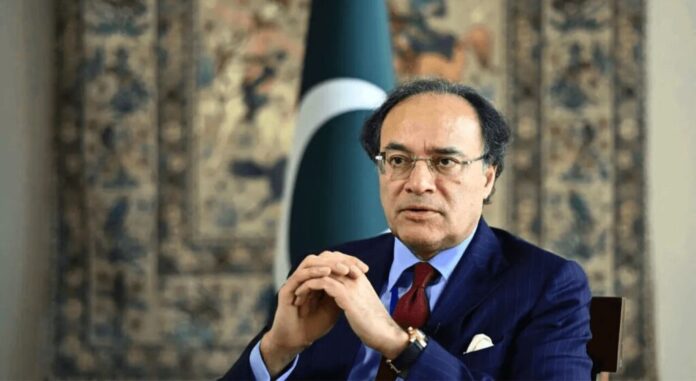KARACHI, Apr 30 (APP): The Federal Minister for Finance and Revenue, Muhammad Aurangzeb Wednesday expressed confidence that the situation evolving at global level after US Tariffs is manageable for Pakistan.
The minister, while addressing the leadership of the business community during his visit to Federation of Pakistan Chambers of Commerce and Industry (FPCCI) here, said that Pakistan already has constructive engagements with US authorities on the sidelines of World Bank and IMF Summer meetings while Prime Minister has also announced to send a high level delegation to the USA for negotiation on tariff issues.
Pakistan’s exports to the USA are around $ 5 billion and the volume of imports from the USA is nearly $ 2 billion while average tariff difference is 3%, he stated and argued that the difference could be balanced with trade of cotton, Soybean and other such commodities.
Referring to a recent visit to the USA, he said that the Pakistani delegation had over 70 fruitful meetings with executives of World Bank, IMF, Asian Development Bank and other multilateral and bilateral partners and think tanks and counterparts from friendly and supporting countries.
Highlighting the turn around in economic conditions and significant improvements in inflation and current account, Aurangzeb said that the current account is expected to remain surplus this fiscal year while expenditures are also under control owing to the efficient role of all stakeholders including the provincial governments.
The finance minister said that steep decline in inflation is a major achievement which allowed a 1000 basis point reduction in the policy rate while the next meeting of the monetary policy committee is due in the next week.
Speaking on past efforts for economic stabilization and boom and bust cycles, he said that it is the 24th IMF program of Pakistan and the Prime Minister and his entire cabinet has resolved that it will be the last IMF program of the country as we are carrying forward the economic and structural reforms agenda for the betterment of our country.
The government is striving to transform the tax administration in consultation with all the stakeholders by simplifying the procedures, utilization of data and minimizing human intervention, Aurangzeb stated, adding that it is a very focused effort this time and there was no question of exemptions anymore.
Salaried and business classes were already under the heavy burden of taxes which could not be increased, he noted and stressed on the need of bringing ease to lives of salaried class.
The finance minister said that efforts were also underway to simplify the tax return forms so that the majority of taxpayers could file their returns conveniently without assistance of any lawyer or tax advisor.
Energy sector reforms is another important agenda of the government that focuses on improvement in all the phases from generation to transmission and distribution of electricity and those measures resulted in reduction of power tariff, he said and hinted some more good news in coming months.
Higher costs of financing, energy and taxation were major challenges for business and industry in Pakistan, he said and added, but now policy rate reductions brought the financing cost lower and some respite has also been observed in power tariffs while rationalization of tax rates in the upcoming budget was under consideration as well.
The government has started the consultation process for budget making early this year and proposals submitted by the chambers and trade associations were being reviewed in detail, the minister stated and added that the government is also working on segregating the tax policy office from FBR and bringing it under the ambit of the Finance ministry. From next year all the stakeholders’ proposals will be considered by the tax policy office while FBR will be responsible for tax collection, he said.
Speaking on public finance management through right sizing of ministries and privatization of state owned enterprises, the finance minister said that decreased borrowing by the government will create space for private sector borrowing.
Private sector has to lead the country and every single sector has to contribute and play its role efficiently and effectively for strengthening the national economy, he urged, stressing collaborative and joint efforts in this regard.
Aurangzeb said that the Rekodiq project announced in the recent Mineral Conference has already got financial closure and its commercial operations are expected to start by 2028. The raw ore and mines have the potential to attract $2.8 billion annually and this could be a game changer for our economy, he opined and also stressed on the need to diversify the export sector.

